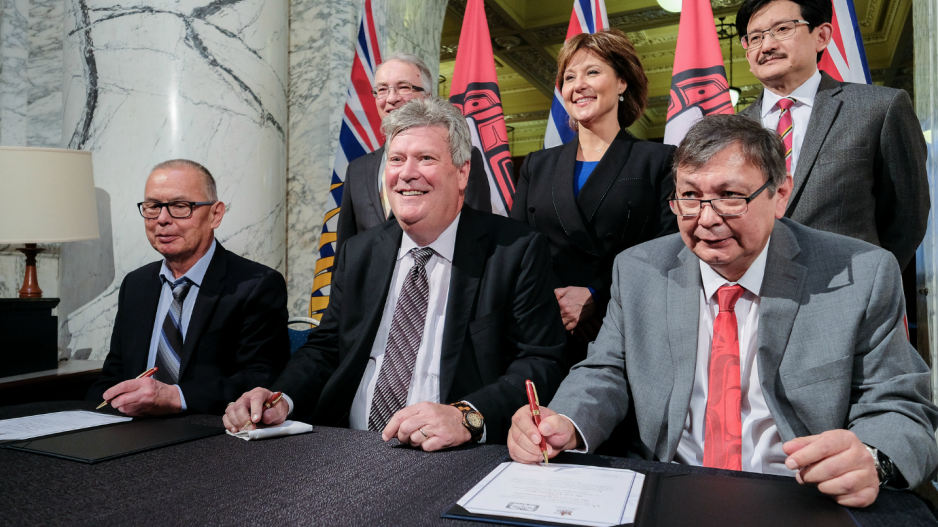A major roadblock for the Pacific NorthWest LNG project in Prince Rupert was dismantled last week when two key First Nations signed benefits agreements worth more than $200 million.
The agreements also remove potential roadblocks for all other liquefied natural gas (LNG) projects in Prince Rupert because the agreement commits the Lax Kw’alaams and Metlakatla to support all other potential LNG projects.
The Lax Kw’alaams and Metlakatla agreed to benefits agreements that, on the surface, looked to be a fraction of what was originally offered to, and rejected by, the Lax Kw’alaams in 2015.
But the $98 million in cash and investments, several chunks of Crown land and $1.4 million in annual revenue sharing that the Lax Kw’alaams formally agreed to last week are just the portion that will come from the provincial government.
John Rustad, minister of aboriginal relations and reconciliation, told Business in Vancouver that Petronas is expected to negotiate its own agreement with the two bands.
“They will sign an impact benefits agreement, as has TransCanada, on the pipe side,” Rustad said.
He referred to the Prince Rupert Gas Transmission pipeline that TransCanada Corp. (TSX:TRP) is building to serve the LNG plant on Prince Rupert’s Lelu Island. First Nations along that pipeline will receive a share of $10 million annually from the pipeline alone.
Asked if he expects criticism that the provincial government is giving up too much of its own revenue from the LNG project to get First Nation support, Rustad said there is plenty of revenue to go around.
“One reasonably sized LNG project, over 15 or 20 years, would generate the same tax revenue as the entire forestry industry generates,” Rustad said.
In 2015, the B.C. government and Petronas offered the Lax Kw’alaams $1.2 billion in cash and land to support the Pacific NorthWest LNG project. The band rejected the offer.
But after John Helin replaced Garry Reece as mayor of the Lax Kw’alaams, the band council had a change of heart.
Helin said last week that the agreement gives his people input on how the project proceeds and will provide his people with ongoing revenue streams, jobs and investments in infrastructure, including roads and ferry service.
“For the first time in my lifetime … we’re really a part of what’s happening within our traditional territory as far as looking after the environment and getting benefits I think we deserve,” Helin said.
Metlakatla Chief Councillor Harold Leighton called the agreement “leading-edge.”
“It gives the Coast Tsimshian a say in how the facilities are going to be built and to make sure they’re built safely,” he said. “The revenue sharing is going to change the communities. And hopefully one day both communities will be self-sufficient. The size and scope of the agreements that we signed are unheard of.”
The agreements signed last week fall under three categories. There are benefits that accrue from the LNG plant itself – including revenue sharing on LNG sales – the pipeline and a new LNG Coastal Fund.
In total, the cash value for the two bands is $144 million: $98 million to the Lax Kw’alaams and $46 million to the Metlakatla. That’s just the provincial government portion.
Rustad said that only a small amount will be paid up front upon a final investment decision and start of construction. The rest will be paid out over a 30-year period.
More important than the cash is the annual revenue sharing. The two bands will receive annual payments from the LNG Coastal Fund and pipeline.
For the Lax Kw’alaams, it amounts to $1.4 million annually. The Metlakatla will receive $500,000 annually from the LNG Coastal Fund.
Approximately 3,000 hectares of Crown land will transfer to the Lax Kw’alaams and Metlakatla. The Lax Kw’alaams will receive several Crown land parcels totalling about 2,000 hectares.
The government also commits to a number of infrastructure upgrades, like roadwork, that will benefit the Lax Kw’alaams and the region in general.
Whether the Lax Kw’alaams Band council has the authority to approve the Pacific NorthWest LNG project is something that might have to be tested in court.
There has been wrangling within the Tsimshian tribes, and particularly the Lax Kw’alaams, as to who represents the community.
Some hereditary chiefs have argued that an elected band council has authority only over Indian reserves and that hereditary chiefs are the true representatives when it comes to claimed territory outside of reserve land.
Recently nine hereditary Tsimshian chiefs came out in support of the project, and some Lax Kw’alaams hereditary chiefs have also challenged Donald Wesley, a hereditary chief who claims he has authority to represent the Lax Kw’alaams. Other hereditary chiefs disagree.
Rustad said the benefits agreement that the Lax Kw’alaams signed last week was approved in a community-wide vote.
“They received overwhelming support to be able to proceed with the agreements,” he said. “I think they’re in a very strong position, in terms of being the spokespeople and representative of the Lax Kw’alaams people.”
The $36 billion question still outstanding is whether Petronas will pull the trigger on a final investment decision.
Wan Badrul Hisham, Petronas’ chief project officer for Pacific NorthWest LNG, made no promises in that regard, but said last week’s agreement was a positive step.




